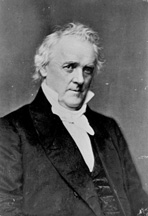James Buchanan: Difference between revisions
imported>Yi Zhe Wu (utah war) |
Pat Palmer (talk | contribs) |
||
| (8 intermediate revisions by 4 users not shown) | |||
| Line 1: | Line 1: | ||
{{subpages}} | {{subpages}} | ||
{{Image|Jbuchanan.jpg|right|350px|James Buchanan}} | |||
'''James Buchanan''' (1791-1868) was an [[United States|American]] politician and the 15th [[ | '''James Buchanan''' (1791-1868) was an [[United States of America|American]] politician and the 15th [[President of the United States of America]], serving from 1857 to 1861. He was born in [[Pennsylvania (U.S. state)|Pennsylvania]] and was the only president in the history of the United States that was never married. Prior to his presidency, he once served in [[House of Representatives]], the [[U.S. Senate]] and as the [[Secretary of State]] under President [[James K. Polk]]. He was a member of the [[Democratic Party]]. | ||
Buchanan's presidency was primarily known for the escalating conflict between the Northern and Southern factions. In 1860, the [[ | Buchanan's presidency was primarily known for the escalating conflict between the Northern and Southern factions. In 1860, the [[Republican Party (United States)|Republican Party]] candidate [[Abraham Lincoln ]] was elected to replace Buchanan. Lincoln was against [[slavery]] and advocated Northern interests, angering the South, which sought to succeed from the Union. Buchanan was unable to halt the succession and the subsequent outbreak of [[American Civil War]]. | ||
Buchanan also oversaw the United States federal government forces against [[Utah]] during the [[Utah War]] of 1857 to 1858, a war which the federal troops defeated the Utahan force led by [[Brigham Young]]. | Buchanan also oversaw the United States federal government forces against [[Utah (U.S. state)|Utah]] during the [[Utah War]] of 1857 to 1858, a war which the federal troops defeated the Utahan force led by [[Brigham Young]]. | ||
==References== | ==References== | ||
*[http://www.whitehouse.gov/history/presidents/jb15.html White House biography] | *[http://www.whitehouse.gov/history/presidents/jb15.html White House biography] | ||
*[http://bioguide.congress.gov/scripts/biodisplay.pl?index=B001005 Congressional biography] | *[http://bioguide.congress.gov/scripts/biodisplay.pl?index=B001005 Congressional biography] | ||
{{start box}} | |||
{{succession box| | |||
before=[[Franklin Pierce]]| | |||
title=[[President of the United States of America]]| | |||
years=1857-1861| | |||
after=[[Abraham Lincoln]] | |||
}} | |||
{{end box}} | |||
Revision as of 09:38, 8 August 2023
James Buchanan (1791-1868) was an American politician and the 15th President of the United States of America, serving from 1857 to 1861. He was born in Pennsylvania and was the only president in the history of the United States that was never married. Prior to his presidency, he once served in House of Representatives, the U.S. Senate and as the Secretary of State under President James K. Polk. He was a member of the Democratic Party.
Buchanan's presidency was primarily known for the escalating conflict between the Northern and Southern factions. In 1860, the Republican Party candidate Abraham Lincoln was elected to replace Buchanan. Lincoln was against slavery and advocated Northern interests, angering the South, which sought to succeed from the Union. Buchanan was unable to halt the succession and the subsequent outbreak of American Civil War.
Buchanan also oversaw the United States federal government forces against Utah during the Utah War of 1857 to 1858, a war which the federal troops defeated the Utahan force led by Brigham Young.
References
